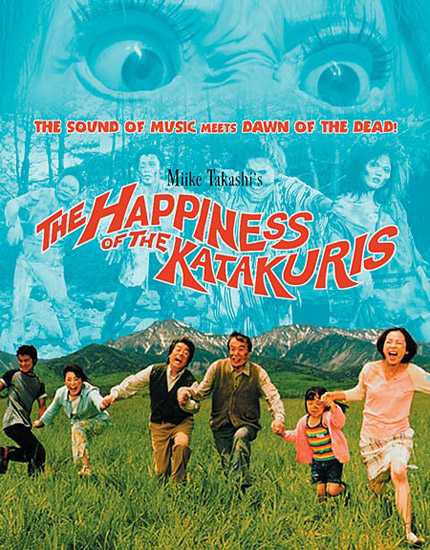The Happiness of the Katakuri’s
 Title: The Happiness of the Katakuri’s
Title: The Happiness of the Katakuri’sRating: 4/5
Genre: Musical, Comedy
Starring: Kenji Sawada, Shinji Takeda, Naomi Nishida,
Language: Japanese
Director: Takashi Miike
The Guardian describes this as ‘The Sound of Music meets Dawn of the Dead,’ and I’m inclined to agree. Filled with low-budget clay animations, bizarre musical numbers and an array of gruesome deaths; this is a black comedy that, whilst ultimately feels a shadow of what it could have been, is nothing if not one of the most bizarre and unique films conceived.
The story centres on the Katakuri family, after losing his job, Masao (Sawada) uses his severance pay to buy a small country inn in the mountains with the promise of a major road to be constructed soon, he employs his family; his elderly parents, ex-con son Masayuki (Takeda), recent divorcée daughter Shizue (Nishida) and her daughter, but their problems are only beginning. With the lack of guests, and unfortunate demise of everyone who checks in, they agree to cover it up to try and ensure the success of their business. With the mysterious arrival of a handsome RAF pilot wooing Shizue, and the suspicion of Masayuki’s guilt over their residents’ untimely demise, the hapless Katakuri family just can’t help but break out into song! Oh, and did I mention the zombies? Yeah, there are zombies.
With a notable vocal performance from Naomi Nishida, there is little else to add to any specific performance. Each performs aptly, capable of bringing a unique quality to their character and provides contrast to the rest of the family, lending a fleshed out feel to the proceedings. With superb use of the youngest – a small child perhaps only 6 or 7 – capable of transforming a scene merely by her presence, and careful mocking of melodramatic ‘soap’ style acting, the are often capable of producing comical scenes, perhaps most notably with the presence of Kiyoshiro Imowano as the mysterious pilot capable of so overtly mocking the bad romantic films flooding the cinemas.
Set against picturesque mountains, with clever use of clay animation for the action scenes, this may be a fairly low-budget film but oddly the plot works wonders in keeping with the bizarre nature of the proceedings. Beyond all the romantic spoofing, amusing deaths and bizarre musical numbers lies a heartfelt message about the bonds within a family and making the most of the situation you find yourself in, which despite all the hostility and feelings of despair towards the start of the film, as things get worse they show the true kinship by the films conclusion.
Despite its strengths, the end result feels lacking compared to what it could have been; too many of the musical numbers, whilst fitting to the story being told, felt all to unmemorable. They are kept short and to the point to avoid becoming monotonous, and are varied enough throughout avoiding any issue of repetition. Furthermore, the story felt a little slow to start, whilst required to understand each of the characters that are presented in a short period of time, makes for something of an unenthused opening. Takashi Miike is a director I have long since admired, not only for his high consistency but for his ability to produce a variety of differing styles within his films, and this proves no different. Certainly worth a watch by any fans of ‘Monty Python’ type humour for its bizarre nature alone.

Comments
Post a Comment